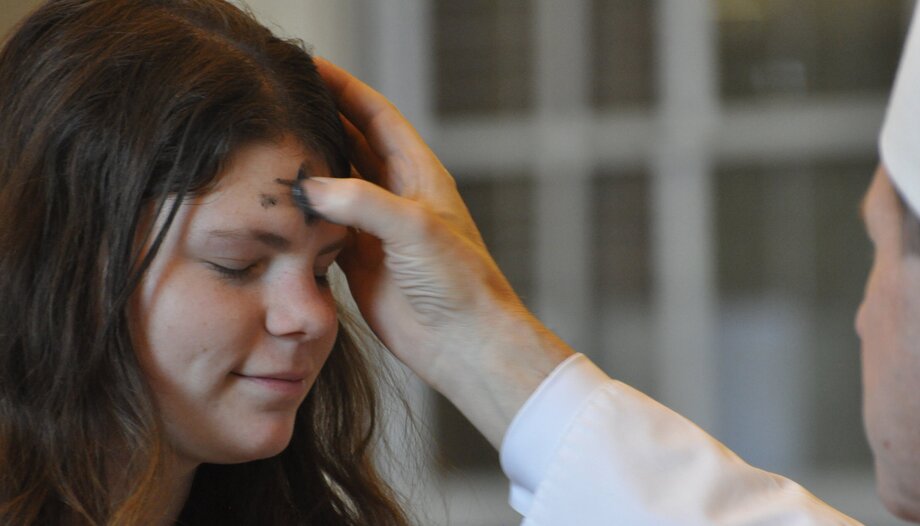Lent lasts forty days, in memory of the forty days Jesus spent in the desert after being baptized by St. John the Baptist. Moreover, during this period Christ was tempted by Satan. When the temptations were overcome, "the devil departed until another time" (Lk 4:13).
With regard to these forty days of Jesus in the desert and the temptations he suffered, the Catechism points out that "the evangelists indicate the salvific meaning of this mysterious event. Jesus is the new Adam who remained faithful where the first Adam succumbed to temptation. Jesus perfectly fulfilled the vocation of Israel: unlike those who previously provoked God for forty years in the desert, Christ reveals himself as the Servant of God totally obedient to the divine will. In this Jesus is the victor over the devil: he has 'bound the strong man' in order to strip him of what he had appropriated. Jesus' victory in the desert over the Tempter is a foretaste of the victory of the Passion, the supreme obedience of his filial love for the Father" (Catechism, 539).
He goes on to add that "the Church unites herself every year, during the forty days of Great Lent, to the Mystery of Jesus in the desert".
Ash Wednesday marks the beginning of Lent, and on this day fasting and abstinence are obligatory. To mark the beginning of this period of penance and conversion, during the mass on this Wednesday, the imposition of ashes takes place.
Pope's Message for Lent
In its message for Lent, the Pope reflected on the forty years that the people of Israel spent in the desert.
"For our Lent to be concrete, the first step is to want to see reality. When the Lord drew Moses to the burning bush and spoke to him, he immediately revealed himself as a God who sees and above all listens," says Francis.
He adds that "God never tires of us. Let us welcome Lent as a powerful time in which his Word is addressed to us once again. [It is a time of conversion, a time of freedom. Jesus himself, as we remember every year on the first Sunday of Lent, was led by the Spirit into the desert to be tested in his freedom. For forty days he will be before us and with us: he is the Son incarnate. Unlike Pharaoh, God does not want subjects, but sons. The desert is the space in which our freedom can mature into a personal decision not to fall back into slavery. In Lent, we find new criteria of judgment and a community with which to embark on a path we have never traveled before".
You can read the complete message here.
Conversion
The Catechism speaks of two conversions: the first call to conversion is addressed "first of all to those who do not yet know Christ and his Gospel. Thus, baptism is the principal place of the first and fundamental conversion. Through faith in the Good News and through baptism one renounces evil and attains salvation, that is, the remission of all sins and the gift of new life" (Catechism, 1427).
However, there is a second conversion after baptism: "Now, Christ's call to conversion continues to resound in the lives of Christians. This second conversion is an uninterrupted task for the whole Church which 'receives sinners into her own bosom' and which, being 'holy and at the same time in need of constant purification, constantly seeks penance and renewal' (Lumen Gentium, 8). This effort of conversion is not only a human work. It is the movement of the 'contrite heart' (Ps 51:19), attracted and moved by grace (cf. Jn. 6:44; 12:32) to respond to the merciful love of God who first loved us (cf. 1 Jn 4:10)" (Catechism, 1428).
An example of this need for conversion of the baptized is Peter's repentance after having denied knowing Jesus: "Jesus' gaze of infinite mercy provokes the tears of repentance (Lk 22:61) and, after the Lord's resurrection, the threefold affirmation of his love for him (cf. Jn 21:15-17). The second conversion also has a communitarian dimension. This appears in the Lord's call to the whole Church: 'Repent'" (Rev 2:5,16).
St. Ambrose says about the two conversions that, 'in the Church, there are water and tears: the water of Baptism and the tears of Penance' (Epistula extra collectionem1 [41], 12)" (Catechism, 1429).
Important dates
This year Holy Thursday and Good Friday fall on March 28 and 29 respectively. Easter Day will be celebrated on March 31.








